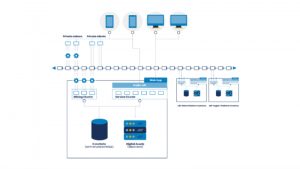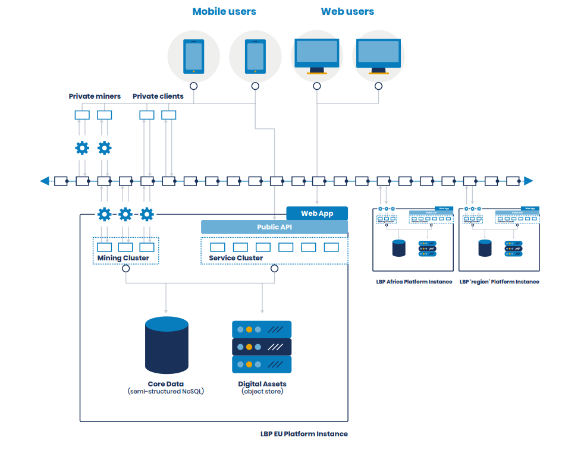
This device has been developed to provide a more cost-effective, faster, more secure and accurate cancer screening solution than current cervical Pap smear systems. Lancor Scientific proposes to add more types of cancer in 2019.

Aamir Butt, CEO of Lancor Scientific, has commented: “Lancor Scientific has dedicated itself to making effective cancer screening available to everyone, everywhere. Our technology will help people to be screened earlier than ever before, so that they can receive necessary treatment, even before symptoms occur.
“Blockchain technology will provide a secure infrastructure to roll-out the device and Lancor Scientific platform. The fight against cancer is an uphill battle for everyone connected, so we hope that our solution can help people in the countries that need it the most. We are delighted to see continued progress towards this ultimate goal.”
The OMIS device and Lancor Blockchain Platform
The Lancor Blockchain Platform (LBP) and Tumour Trace partnership is the product of 14 years of development and $5m investment. Invented by Professor Djuro Koruga, Tumour Trace’s Chief Scientific Officer, the Tumour Trace OMIS (Opto-magnetic Imaging Spectroscopy) device derives from research at the University of Belgrade.
The OMIS device uses light to detect the state of electromagnetism in tissue. When tissue becomes cancerous, the magnetic profile of cells changes:
- healthy tissue demonstrates a diamagnetic profile
- malignant tissue demonstrates a paramagnetic profile.
The OMIS device takes advantage of the photoelectric effect in quantum physics. When light shines onto tissue, the magnetic component of the reflected light from the tissue can determine how malignant it is. This means that the device does not subject patients to potentially dangerous ultraviolet, X-ray or microwave radiation.
The patented technology is validated and CE marked for cervical cancer – following a number of clinical trials with partners, including the NHS – across some 2,000 people. It currently runs at 90% accuracy. This compared to the 60% accuracy that Pap screening offers. By using AI to remove biological noise from samples, the aim is to reach 97% accuracy.
The Lancor Blockchain Platform
The LBP allows patient data to be analysed and stored securely. It lets patients – and regional, national and international organisations – access the right data at the right time. This will happen in an affordable, safe and timely way. Lancor will, therefore, exploit blockchain technology to:
- validate the screening devices
- unlock patient records
- write results to a registry
- take payment for the cancer tests
- provide real-time screening results.

Lancor Scientific will store the results using a combination of on- and off-chain ledgers in patient-owned secure profiles.
The LBP will consist of the following main components:
- The distributed ledger: this acts as a tamper-proof, publicly-verifiable system of record for currency (the Medici Token) and transactions; it is the primary source of trust and includes a register of approved devices while guaranteeing the principal terms of transactions conducted on the platform.
- Regional off-chain data stores: these will hold all primary data, including personal data of patients, history of their medical services provided through the platform and the data and results relating to individual screenings; data will split between a core data model, expressed in a record-based semi-structured schema, and an object store holding individual data assets (such as test results).
- Regional application platforms: these will provide access to primary data through a curated API layer, as well as providing the end-points for web and mobile apps; additional functionality, such as messaging and appointment scheduling, can be facilitated by the application layer.
- Client applications: these consist of a web client and mobile apps (for iOS and Android) which provide all functionality to patients; clinics and service providers will have access to additional functionality, such as registering devices and locations, booking in patients and recording test results.
Enterprise Times: what does this mean
Lancor Scientific is a London-based medtech company which is creating a blockchain-based global cancer registry. It objective is to address issues of data security and fragmented records in healthcare.
Backed by this blockchain approach costs can dramatically decrease. Pap and HPV cost £30-40, whereas a cervical cancer screening using OMIS costs around £5-10. It may also represent a solution to fast-track healthcare technologies in developing countries.
Aside from the attractions of making any form of medicine ‘simpler’ to access (for patients and care providers), this Lancor Scientific’s initiative seems to observe many of the five characteristics Enterprise Times sees as being necessary for blockchains to be successful.


























